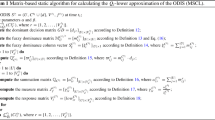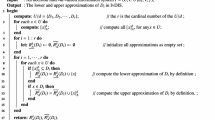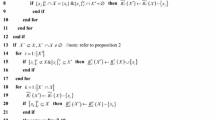Abstract
In the new era of information society, dynamic data is common and widely applied in many fields. To save the computing time of upper and lower approximations in rough methods, it is wise to study the incremental methods of calculating approximations and construct the incremental algorithms. In this study, we mainly focus on maintaining approximations dynamically in interval-valued ordered decision systems when the feature set and sample set increase or decrease, respectively. Firstly, the dominance relation on interval-valued ordered decision system are discussed. The two notions of interval dominance degree and interval overlap degree (denoted as IDD and IOD respectively) are introduced to describe the preference relation between interval values. Then, the incremental updating rules of approximations for four circumstances, namely adding attributes, removing attributes, adding objects, and removing objects, are obtained based on the matrix expression of approximations and dominated sets. Furthermore, the incremental algorithms are derived accordingly. By using six preprocessed data sets from UCI repository, a series of evaluations and comparisons are made on the calculation time of static algorithm and incremental algorithms. From these comparative experiments, the effectiveness and superiority of the proposed dynamic algorithms could be verified.




Similar content being viewed by others
Data availability
The datasets generated during and/or analysed during the current study are available in the UCI repository, https://archive.ics.uci.edu/ml/index.php.
References
Hanyu E, Cui Y, Pedrycz W, Li Z (2022) Fuzzy relational matrix factorization and its granular characterization in data description. IEEE Trans Fuzzy Syst 30(3):794–804
Fujita H, Gaeta A, Loia V, Orciuoli F (2019) Resilience analysis of critical infrastructures: a cognitive approach based on Granular Computing. IEEE Trans Cybern 49:1835–1848
Li W, Zhai S, Xu W, Pedrycz W, Qian Y, Ding W, Zhan T (2022) Feature selection approach based on improved Fuzzy C-Means with principle of refined justifiable granularity. IEEE Trans Fuzzy Syst. https://doi.org/10.1109/TFUZZ.2022.3217377
Pedrycz W (2013) Granular computing: analysis and design of intelligent systems. CRC Press
Sun L, Wang TX, Ding WP, Xu JC (2022) Partial multilabel learning using fuzzy neighbourhood-based ball clustering and kernel extreme learning machine. IEEE Trans Fuzzy Syst. https://doi.org/10.1109/TFUZZ.2022.3222941
Sun L, Li M, Ding W, Zhang E, Mu X, Xu J (2022) AFNFS: adaptive fuzzy neighborhood-based feature selection with adaptive synthetic over-sampling for imbalanced data. Inf Sci 612:724–744
Sun L, Wang X, Ding W, Xu J (2022) TSFNFR: two-stage fuzzy neighborhood-based feature reduction with binary whale optimization algorithm for imbalanced data classification. Knowl-Based Syst 256:109849
Sun L, Zhang J, Ding W, Xu J (2022) Feature reduction for imbalanced data classification using similarity-based feature clustering with adaptive weighted k-nearest neighbors. Inf Sci 593:591–613
Xu W, Li W (2016) Granular computing approach to two-way learning based on formal concept analysis in fuzzy datasets. IEEE Trans Cybern 46(2):366–379
Pawlak Z (1982) Rough sets. J Comput. Inf Sci 11:341–356
Dembczynski K, Greco S, Slowinski R (2009) Rough set approach to multiple criteria classification with imprecise evaluations and assignments. Eur J Oper Res 198:626–636
Luo C, Li T, Huang Y, Fujita H (2019) Updating three-way decisions in incomplete multi-scale information systems. Inf Sci 476:274–289
Wu WZ, Leung Y (2013) Optimal scale selection for multi-scale decision tables. Int J Approx Reason 54:1107–1129
Xu Y, Wang L, Zhang R (2011) A dynamic attribute reduction algorithm based on 0–1 integer programming. Knowl-Based Syst 24:1341–1347
Yang D, Deng T, Fujita H (2020) Partial-overall dominance three-way decision models in interval-valued decision systems. Int J Approx Reason 126:308–3225
Zhan J, Wang J, Ding W, Yao Y (2022) Three-way behavioral decision making with hesitant fuzzy information systems: survey and challenges. IEEE/CAA J Autom Sin 10(2):330–350
Zhang X, Yao Y (2022) Tri-level attribute reduction in rough set theory. Expert Syst Appl 190:116187
Zhao X, Miao D, Fujita H (2021) Variable-precision three-way concepts in L-contexts. Int J Approx Reason 130:107–125
Zhou J, Lai Z, Miao D, Gao C, Yue X (2020) Multigranulation rough-fuzzy clustering based on shadowed sets. Inf Sci 507:553–573
Zhou J, Pedrycz W, Gao C, Lai Z, Yue X (2021) Principles for constructing three-way approximations of fuzzy sets: a comparative evaluation based on unsupervised learning. Fuzzy Sets Syst 413:74–98
Greco S, Matarazzo B, Slowinski R (2002) Rough approximation by dominance relations. Int J Intell Syst 17:153–171
Greco S, Matarazzo B, Slowinski R (2005) Variable consistency model of dominance-based rough set approach. Lect Not Comput Sci 170–181:2001
Blaszczynski J, Greco S, Slowinski R, Szelag M (2009) Monotonic variable consistency rough set approaches. Int J Approx Reason 50:979–999
Kotlowski W, Blaszczynski J, Greco S, Slowinski R (2008) Stochastic dominance-based rough set model for ordinal classification. Infor Sci 178:4019–4037
Sun B, Ma W, Gong Z (2014) Dominance-based rough set theory over interval-valued information systems. Exp Syst 31(2):185–197
Li W, Zhou H, Xu W, Wang XZ, Pedrycz W (2022) Interval dominance-based feature selection for interval-valued ordered data. IEEE Trans Neur Netw Learn Syst. https://doi.org/10.1109/TNNLS.2022.3184120
Yang X, Qi Y, Yu DJ, Yu H, Yang J (2015) \(\alpha \)-dominance relation and rough sets in interval-valued information systems. Inf Sci 294:334–347
Chen H, Li T, Ruan D, Lin J, Hu C (2011) A rough-set-based incremental approach for updating approximations under dynamic maintenance environments. IEEE Trans Knowl Data Eng 25:274–284
Cheng Y (2011) The incremental method for fast computing the rough fuzzy approximations. Data Knwol Eng 70:84–100
Das AK, Sengupta S, Bhattacharyya S (2018) A group incremental feature selection for classification using rough set theory based genetic algorithm. Appl Soft Comput 65:400–411
Liu H, Sentiono R (1998) Incremental feature selection. Appl Intell 9:217–230
Ni P, Zhao S, Wang X, Chen H, Li C, Yang ECC (2020) Incremental feature selection based on fuzzy rough sets. Inf Sci 536:185–204
Perkins S, Lacker K, Theiler J (2003) Grafting: fast, incremental feature selection by gradient descent in fuction space. J Mach Learn Res 3:1333–1356
Wang F, Liang J, Hua Y (2013) Attribute reduction: a dimension incremental strategy. Knowl-Based Syst 39:95–108
Guo Y, Tsang ECC, Hu M, Lin X, Chen D, Xu W, Sang B (2020) Incremental updating approximations for double-quantitative decision-theoretic rough sets with the variation of objects. Knowl-Based Syst 189(2):105082
Hu C, Liu S, Liu G (2017) Matrix-based approaches for dynamic updating approximations in multigranulation rough sets. Knowl-Based Syst 122:51–63
Huang Y, Li T, Luo C, Fujita H, Horng S (2017) Matrix-based dynamic updating rough fuzzy approximations for data mining. Knowl-Based Syst 119:273–283
Li W, Xu W, Zhang X, Zhang J (2022) Updating approximations with dynamic objects based on local multigranulation rough sets in ordered information systems. Artif Intell Review 55(8):1821–1855
Chen D, Yang Y, Dong Z (2016) An incremental algorithm for attribute reduction with variable precision rough sets. Appl Soft Comput 45:129–149
Hu C, Liu S, Huang X (2017) Dynamic updating approximations in multigranulation rough sets while refining or coarsening attribute values. Knowl-Based Syst 130:62–73
Jing Y, Li T, Fujita H, Yu Z, Wang B (2017) An incremental attribute reduction approach based on knowledge granularity with a multi-granulation view. Inf Sci 411:23–38
Lang G, Miao D, Cai M, Zhang Z (2017) Incremental approaches for updating reducts in dynamic covering information systems. Knowl-Based Syst 134:85–104
Luo C, Li T, Chen H (2014) Dynamic maintenance of approximations in set-valued ordered decision systems under the attribute generalization. Inf Sci 257:210–228
Shu W, Shen H (2014) Updating attribute reduction in incomplete decision systems with the variation of attribute set. Int J Approx Reason 55:867–884
Yang Y, Chen D, Wang H, Wang X (2018) Incremental perspective for feature selection based on fuzzy rough sets. IEEE Trans Fuzzy Syst 26:1257–1273
Dong L, Chen D (2020) Incremental attribute reduction with rough set for dynamic datasets with simultaneously increasing samples and attributes. Int J Mach Learn Cyb 11:1339–1355
Funding
This work was supported in part by the National Natural Science Foundation of China (Nos. 12201518, 62272284), the China Postdoctoral Science Foundation (No. 2021M700432), the Special Fund for Science and Technology Innovation Teams of Shanxi (202204051001015), the Science and Technology Research Program of Chongqing Education Commission (KJQN202100205, KJQN202100206), and the Scientific and Technological Project of Construction of Double City Economic Circle in Chengdu-Chongqing Area (No. KJCX2020009).
Author information
Authors and Affiliations
Contributions
Haoxiang Zhou: Writing-Original Draft; Methodology. Wentao Li: Supervision, Validation. Chao Zhang: Investigation, Formal Analysis. Tao Zhan: Data Curation, Investigation, Validation.
Corresponding author
Ethics declarations
Ethical and informed consent for data used statement
Authors are ethical and informed consent for data used.
Conflict of interest
There is no conflict of interest.
Additional information
Publisher's Note
Springer Nature remains neutral with regard to jurisdictional claims in published maps and institutional affiliations.
Rights and permissions
Springer Nature or its licensor (e.g. a society or other partner) holds exclusive rights to this article under a publishing agreement with the author(s) or other rightsholder(s); author self-archiving of the accepted manuscript version of this article is solely governed by the terms of such publishing agreement and applicable law.
About this article
Cite this article
Zhou, H., Li, W., Zhang, C. et al. Dynamic maintenance of updating rough approximations in interval-valued ordered decision systems. Appl Intell 53, 22161–22178 (2023). https://doi.org/10.1007/s10489-023-04655-9
Accepted:
Published:
Issue Date:
DOI: https://doi.org/10.1007/s10489-023-04655-9




